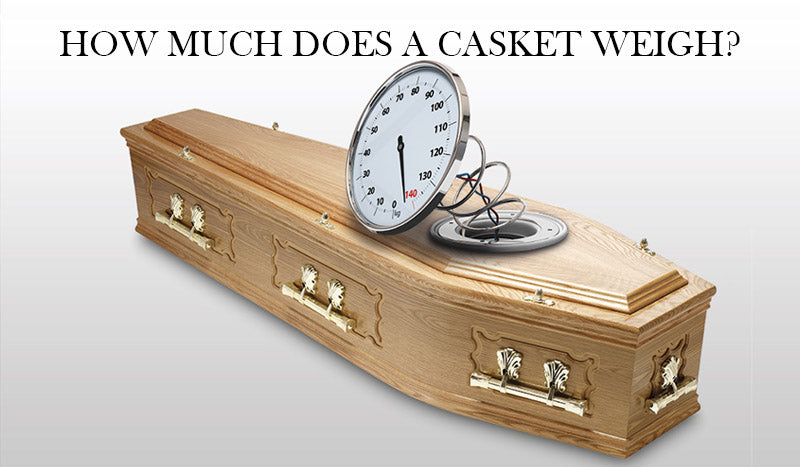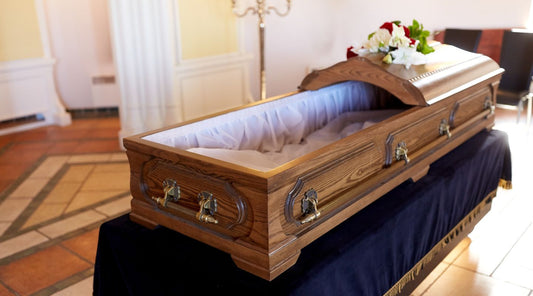
How Much Does a Casket Weigh?
There are many things we cannot avoid in life, and death and funerals are to name. When someone close to us dies, we will have to deal with both the pain and trauma together with planning for the funeral ceremonies, especially if the deceased hasn’t left detailed instructions. From picking the casket to the final disposal of the remains, there are many aspects and problems to manage at a funeral.
Even if the casket weight doesn’t make a common topic in conversations, you may have wondered (especially while watching the pallbearers in real life or movies) how much does a casket weigh.
The answer is not straightforward, since several elements will affect the overall weight of a casket. The materials used for making the casket make the most crucial factor for weight, so let's have a closer look at the most common materials used. If you're looking for a casket that's at the same time elegant and cost effective, our collections are here to browse through.
Wood
Sturdy and beautiful, wood is one popular choice for casket materials. Caskets have evolved from simple coffins in all aspects: size, adornments, weight. Generally speaking, a wooden casket weighs from 150 to 250 pounds, with some woods being heavier than others. Pine (it weighs around 150 pounds) is considered light, whereas mahogany (as heavy as 250 pounds) stands as the heaviest, along with cherry wood.

Oak, walnut, and maple are in the middle when we talk about weight and are widely available.
Here are the details for each category of wood:
- Softwood (cottonwood, pine, willow, poplar, and tulip tree)- 95 to 180 pounds and weight capacity up to 300 pounds
- Hardwood (maple, walnut, and birch 165 to 215 pounds, with a weight capacity up to 350 pounds
- High-end hardwood (cherry, walnut, and mahogany) – casket weight ranges from 180 to 285 pounds, and the maximum weight capacity up to 400 pounds.
Metal
Most people are tempted to believe that metal caskets are heavier than wood caskets for apparent reasons. However, reality proves them wrong. With metal being more robust than wood, it wouldn’t have to be as thick as wood to provide security. It’s why metal caskets are made with thinner walls, which leads to lighter overall weight; most metal caskets weight from 160 to 200 pounds.

Several kinds of metal may be utilized for caskets, with 18-20 gauge steel as the most popular choice. Copper and gold can also serve as materials for caskets, with gold caskets standing out as the heaviest and priciest models.
20-gauge steel caskets and stainless steel caskets will weigh anything from 170-190 pounds. Checking the numbers will clear things out.
- Steel and stainless steel caskets with 500 pounds maximum capacity will weigh from 170 to 220 pounds.
- Bronze and copper caskets with 500-pound maximum capacity range from 260 to 310 pounds.
Most metal caskets have a 500-pound maximum capacity. Since bronze and copper are denser than stainless steel or steel, they will weigh more than steel caskets, even if they have the same casket dimensions.
Keep in mind that the gauge's metal caskets are commonly categorized, which refers to the metal thickness. 18 to 20 gauge make the most popular thicknesses; the thicker the metal, the lower the gauge and the heavier the casket.
Copper and bronze make exceptions, as they don’t depend on thickness but weight.
Plywood and wood veneer
Should you be on a tight budget, plywood and wood veneer caskets make an excellent option. They don’t weigh as heavy as hardwood, and most of the time, they come with a veneer or hardwood finish to resemble solid wood. Manufacturers provide a great variety of colors for these caskets too, so you have several options to select from.

Caskets made of plywood or fiberboard with 190 to 300 pounds capacity will weigh anything from 80 to 180 pounds.
Wicker

Wicker caskets are also very light, weighing up to 110 pounds while remaining secure and long-lasting. A wicker casket usually has up to 300 pounds maximum capacity as well.
Cardboard
Not only that cardboard caskets are light, but they’re also biodegradable, which is why they make an environmentally-friendly choice. Recycled materials are used for cardboard casket, which can also be used for cremation.

Cardboard caskets weigh anything from 20 to 80 pounds and have about 280-pound maximum capacity. Despite their weight, cardboard caskets from respectable manufacturers will still be stable and secure. For a more elegant look, these caskets can be covered with fabric.
What other aspects affect casket weight?
The material used for the casket remains the most critical aspect affecting the weight of the casket, but some other factors count for the overall weight as well.
Casket size
Two main categories of caskets exist when it comes to size: standard and oversized casket. The latter is made for taller or heavier bodies, making sense that they weigh more than the standard models.
Standard Caskets
Standard caskets typically are 28.5” wide(outside) and about 82” long(outside), accommodating a person 6’6” tall. If the knees are bent, persons 6’6” tall can also fit in standard caskets. A typical inner dimensions of the casket is 78' length and 24' width.
The person has to be measured across at the elbows or the shoulders to identify the width. This area is typically the widest part of one’s body.
Persons weighing up to 300lb usually will fit in standard caskets. These caskets weigh from 160 to 220 pounds, depending on the material they're made of, and have a 300-pound maximum capacity.
Oversized Caskets
Taller or wider people will be placed in oversized caskets. These caskets often come in sizes 27.5 inch(interior), 31 inch (interior), or 33 inch(interior) width. Keep in mind that most standard cemetery plots/vaults are 30” wide, and for oversized caskets with width more than 30' you need oversized vault.
Wider caskets will not fit the standard sized burial plots, so adjustments would have to be made, which increases the funeral spending.
Oversized caskets weigh from 220 to 280 pounds and usually have a 500-pound maximum capacity.
Hardware & decorative details
Hinges and clasps are standard for most caskets, while handles and rods will ease the casket's handling. When made of solid metals or brass, the hardware becomes quite heavy, adding weight to the casket.
Some people will also have the casket’s interior decorated with panels, various adornments, and items with sentimental value, increasing the casket's overall weight.
Inner materials
The fabric inside the casket won't affect much the casket's overall weight, but it can add to a container's weight. Rubber gaskets used to seal the casket and protect the interior against the elements make such an example.
Choosing a casket makes the most critical decision on a funeral, and there are so many things to consider when selecting a model. Gathering plenty of information will ease out the selection process, for sure.
The casket weight is vital to consider only in terms of the weight/height/width of the deceased, but it’s an essential criterion nevertheless.
We should also remind you that some regulations may differ between jurisdictions, so you should have a talk with your local funeral directors for precise and up-to-date information. The last thing you want is to buy a casket that doesn’t fit the cemetery plot.
What’s the final weight that pallbearers will carry?
Pallbearers will have to carry the casket with the body inside, so they will have to transport the body's weight and the coffin. 370 to 400 pounds is the final weight that pallbearers will carry if the casket is standard sized, 200 pounds heavy, whereas the adult body is 200 pounds (male) or 170 pounds (female).
Blog Author: Tim


